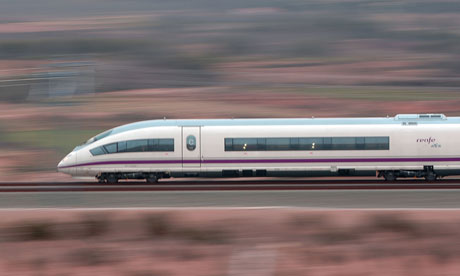Spain must halt rail expansion, says expert
 |
A high-speed rail link in Spain |
Spain's massive investment in high speed rail, expansion of international-grade airports and construction of motorways that radiate from Madrid without helping areas with the heaviest traffic, need to be stopped to arrest the country's slide into debt, according to one of the country's economic experts.
Germà Bel, an economics professor at Barcelona University, said Spain is wedded to vanity projects it cannot afford and a centralised system of government that continues to perform redundant tasks.
Without a review of spending decisions taken in the 10 years before the financial crash, the country will have a harder time escaping from recession and the country's 17 regions will be forced to make further cuts in education and health spending, he said.
In 2000 former prime minister José Luis Rodríguez Zapatero said he wanted to build high speed lines to all regional capitals. Bel said projects costing €45bn (£36bn) have been completed or are going ahead despite a collapse in the government's finances and a flawed case for linking some cities with Madrid, said Bel.
Last year the Portuguese government suspended a planned line from Madrid to Lisbon and has since downgraded the project. On the Portuguese side of the border, it will have a lower top speed and passenger trains will share the line with freight. But Madrid is pressing ahead with a €4bn project based on the original specification of two separate lines.
Currently only China is building more high speed track than Spain.
"In France they are committed to high speed rail, but only when there is a strong business case. It costs much more money to build and maintain high speed rail systems than standard systems. Money Spain does not have," he said.
Bel said funds have consistently been directed away from upgrades to local and commuter lines, which are "falling apart".
Spain's railways, like its ports, are state-owned and run from ministries in Madrid. All airports are run by publicly owned companies and most are international airports that need costly security arrangements. Spain has double the German number of international airports.
Bel says the rightwing government of Mariano Rajoy has yet to look at structural reforms that would decentralise or privatise powers currently held in Madrid.
"You only need to look at the education and health departments. There are hundreds of civil servants in the capital with nothing to do because Madrid has no powers. They are run by the regions," he said.
Bel, a former socialist MP and economic adviser in the Spanish parliament, said Spain is suffering from a sclerosis that prevents it reacting to changing circumstances.
"Even Italy has presented a package of structural reforms. Not just labour market reforms but ones that reform how the state operates.
.jpg)

Comments
Post a Comment